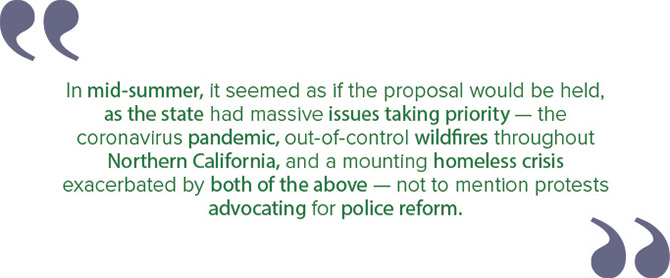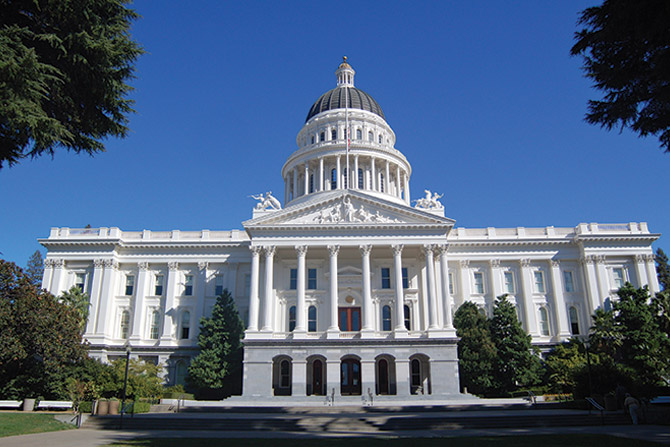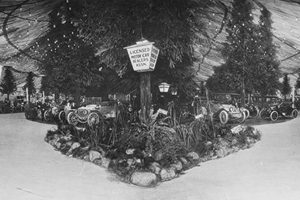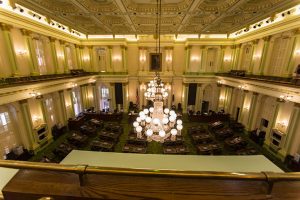By Alisa Reinhardt, Director of Government Affairs
When the California legislature reconvened Jan. 6, 2020, they had no idea that just a few short months later, they would be faced with a wholly different set of priorities and responding to a directive from both Senate and Assembly leadership to drop all bills unrelated to addressing the COVID-19 pandemic.
For many legislators, this was the last session of their careers as an Assembly member or as a Senator due to term limits or the pursuit of other political positions; for others, it was an unconventional introduction to the second half of the 2019-20 session. For all legislators, the coronavirus and its effect on California residents required them to undertake an unprecedented shifting of priorities and commitments — and to get it all done before midnight Monday, August 31st.
In addition to a total shift of direction, the 2019-20 legislative session brought a larger-than-usual amount of drama that came to a fever pitch with only hours left to pass hundreds of measures on to the Governor’s desk.
On the Assembly side, many legislators were upset that Buffy Wicks (D-Oakland), elected in 2018, was denied the ability to vote on bills remotely — despite having a one-month-old baby and being hesitant to travel with her infant in a pandemic. Assemblywoman Wicks became an unexpected internet sensation due to her presence in the Assembly chamber, making speeches about bills while holding her newborn baby. The drama in the Assembly came to a head because of SB 1383 by Senator Hannah Beth Jackson (D-Santa Barbara), a bill discussed in more detail below that will significantly expand California’s family and medical leave laws. When this bill came up for a vote, moderate Assembly Democrats held their unified position against the bill until literally the last few minutes before midnight, when the cards started to fall, and opposition votes were picked off one by one.
In the Senate, an early evening motion by Senator Bob Hertzberg to limit discussion on bills to two support positions, two oppose positions, and impose a time limit on comments was met with impassioned opposition by Senate Republicans, who had seen all but one of their caucus relegated to debating on bills and voting on measures from their Sacramento residences due to interactions with Senator Brian Jones (R-Santee), who tested positive for COVID-19 just before the last day of the session. Senator Hertzberg’s motion was an effort to fast-track the passage of bills off the Senate floor so the Democrat supermajority could have as many measures as possible reach the Governor’s desk.
Senate Republicans, led by Senate Minority Leader Shannon Grove, argued heatedly against Senator Hertzberg’s motion, characterizing his effort as a partisan move engineered to silence Republican voices. Senator Melissa Melendez (R-Lake Elsinore) was even heard on a hot mic angrily calling the motion “bullshit,” a sentiment that she later emphasized on Twitter. After a series of sudden Senate recesses, it became clear that Senate Pro Tem Toni Atkins was working feverishly behind the scenes to moderate a solution that would be acceptable to both sides and get the Chamber working again. After an hour or two of these negotiations, the Senate came back online, Senator Hertzberg’s motion to limit debate was withdrawn, and the night continued.
Below are the top three measures CNCDA focused on this past year.
AB 326 — Electric Mobility Manufacturers
Of the few thousand bills introduced this session, many had to be abandoned; some were then used as vehicles for coronavirus relief efforts. One notable piece of discontinued legislation was SB 1445 by Senator Ben Allen (D-Santa Monica) related to electric mobility manufacturers. The bill was introduced in February 2020, but it quickly became apparent that legislators had much bigger issues that needed attention and so the bill was dropped. This bill aimed to create a new category under the law for an “electric mobility manufacturer” called Canoo to offer vehicle subscriptions directly to consumers. The bill had an abundance of consumer protection flaws. It raised serious franchise-related concerns, but once Senator Allen dropped it in response to leadership requests to abandon non-COVID bills, it seemed like a battle we would have another year.
However, the bill was resurrected in a surprise gut-and-amend about a month before the end of session into AB 326, carried by Assemblyman Al Muratsuchi (D-Torrance) — a surprise since the bill was not related to COVID in any way. Some supporters of the bill didn’t even realize the bill had been gutted and amended and accidentally continued their support of the measure, including the City of Thousand Oaks, which had been in support of the bill in its previous form — a bill trying to regulate motorized scooters on public rights of way. Once the city was made aware of its official support position on a completely different bill than what they signed up for, they immediately rescinded their support of the measure, noting the Thousand Oaks Auto Mall and its positive impact on the region.

Since the bill had already passed the Assembly in its previous form, it didn’t receive the scrutiny it should have. It passed out of the Senate Transportation Committee despite many questions raised about the flawed measure by both Democrat and Republican committee members. Senator Ben Allen presented the bill in committee as a necessary measure for the state to meet its electric vehicle goals and claimed dealers and auto manufacturers were fighting it because they are anti-innovation and didn’t want the competition in the market from a new vehicle manufacturer. Despite some legislators on the committee seeming hesitant to vote yes, the bill was voted out of committee less than two weeks after being gutted and amended into a completely different bill. A handful of legislators said privately that they did not feel comfortable voting against the chair of the committee, Senator Jim Beall, as it was his last committee hearing, and he was recommending an “aye” vote. Other legislators looked at the measure, saw that it was related to electric vehicles, and voted yes without digging any deeper.
From there, the bill moved to the Senate Appropriations Committee. The measure originally had a projected fiscal cost of $300,000 due to the work DMV would have to undertake to implement its licensing and permitting provisions. However, at the last minute, the proponents amended the bill and removed almost all DMV authority — essentially creating a wholly unregulated space for themselves in which to retail vehicles. Despite this complete lack of state oversight, the bill moved forward once more and passed out of the Senate Appropriations Committee. At this point, we were up against a long list of proponents who are pro-electric vehicle but did not seem to fully grasp many other aspects of this flawed measure. The automakers had been opposing the bill alongside us but ended up going neutral on the bill at the last minute — leaving the dealers to fight the legislation on our own. After it became clear that the bill would move to the Senate floor, activation efforts were undertaken in earnest. Hundreds of dealers sent letters and emails to legislators, and some even called and texted their local Senators. John Sackrison at the Orange County Auto Dealers Association, Bob Smith at the Greater Los Angeles New Car Dealers Association, Dean Mansfield at the New Car Dealers Association San Diego County, Steve Smith at the Silicon Valley Auto Dealers Association, and Stacey Castle at the Greater Sacramento New Car Dealers Association, provided vital on-the-ground outreach to both dealers and Senators, moving the needle just enough that coupled with many hours of advocacy and negotiations we had with legislators and staff, we were able to kill the bill on the Senate floor.
This was especially notable since it took place in the last hours of the 2019-20 legislative session with a vote of 18-12, with 10 abstentions (the proponents needed 21 votes to pass their bill). Despite the bill being held open on call, meaning legislators could revisit the measure and take another vote before the midnight deadline, the proponents realized they didn’t have the support they needed and the bill died with the closing gavel.
This was a huge victory for dealers statewide and showed the positive effect our members can have once we coalesce around an issue. Senators recognize the positive effect dealers have on the communities they serve, from the employment of residents to vehicle service to the generation of tax revenue that funds a region’s services and parks. However, despite our big win, we know this effort will come back again next year, and we will be ready.
California Department of Financial Protection and Innovation
When Governor Gavin Newsom proposed the creation of the Department of Financial Protection and Innovation (DFPI) in January 2020, all California businesses took notice and started mobilizing. Governor Newsom envisioned the DFPI to be housed within the existing Department of Business Oversight (DBO) and modeled after the federal Consumer Financial Protection Bureau (CFPB) – an agency whose purview dealers were expressly exempted from under the Dodd-Frank Wall Street Reform Act.
The new DFPI was provided for in a budget trailer bill, which many legislators took issue with because that method resulted in less debate within individual legislative committees about the nuts and bolts of such a complicated oversight effort. The agency will have the authority to bring enforcement actions against companies, issue fines and crackdown on “unfair, deceptive and abusive acts or practices.” Many involved in negotiations felt that the effort was being unduly rushed.
In mid-summer, it seemed as if the proposal would be held, as the state had massive issues taking priority — the coronavirus pandemic, out-of-control wildfires throughout Northern California, and a mounting homeless crisis exacerbated by both of the above — not to mention protests advocating for police reform.
During the few debates held on the DFPI proposal, some legislators expressed hesitance at creating a brand-new agency that will regulate businesses with a heavy hand during a time when many businesses are struggling to survive as it is. Many arguments were advanced that the creation of this agency should not move forward since it is not related to COVID. In contrast, agency proponents claimed this agency is needed now more than ever due to “record numbers of consumer complaints” coming into the state agencies against various businesses.
Those pushing this proposal argued that the goal wasn’t to regulate businesses that are already licensed by a state agency; instead, they said they were trying to protect consumers from predatory lending by capturing entities like largely unregulated payday lenders. However, as drafted, there is some apparent ambiguity that will likely be tested in the courts for years to come.
For our part, we negotiated with DBO for months about getting an industry-specific carve-out from the new agency’s oversight, as dealers are already heavily regulated by numerous state and federal agencies, including the Department of Motor Vehicles, Department of Consumer Affairs, Bureau of Automotive Repair, Department of Industrial Relations, Occupational Safety and Health Standards Board, Labor Commissioner’s Office, Division of Workers’ Compensation, Department of Tax and Fee Administration, CalRecycle, Office of Environmental Health Hazard Assessment, Department of Toxic Substances Control, Department of Water Resources, Air Resources Board, New Motor Vehicle Board, Attorney General’s Office, city and county officials throughout the state, and the Federal Trade Commission.
Despite the goal of only regulating businesses not already subject to oversight by other state agencies, the proponents refused to grant a dealer-specific carve-out. However, franchised new-car dealers find themselves in a more advantageous position than many other industries due to an exchange, recorded on video, during a hearing on the DFPI proposal in the Assembly Banking and Finance Committee one day before the end of the session, where DBO officials clearly and expressly stated that they do not believe new car dealers are subject to DFPI oversight since other agencies already license them. The statement came after Assemblyman Tim Grayson (D-Concord) asked, on camera, about dealer concerns and challenged the DBO official to address them. We are the only industry that was able to get this express statement from a DBO official during the proposal’s handful of hearings.
Despite heavy industry opposition, along with opposition from many state lawmakers, the measure passed due to the Governor’s strong support. Some think it is possible that Richard Cordray, the previous head of CFPB under President Obama, may take the helm of DFPI considering that he testified in support of the measure the weekend before its eventual passage. Agency leadership and priorities are details that will be unveiled in the coming months.
SB 1383 – Significant Expansion of Family and Medical Leave
Currently, under the California Family Rights Act (CFRA), California employers with 50 or more employees must provide 12 weeks of job protection to employees due to illness of themselves or a family member or to bond with a new child. A previous expansion, called the New Parent Leave Act, required employers with 20-49 employees to provide employees with 12 weeks of job protection for bonding with a new child.
SB 1383 by Senator Hannah Beth Jackson (D-Santa Barbara) expands the coverage of this job-protected unpaid leave for both illness and baby bonding to employees at companies with five or more employees. CNCDA was part of a large business coalition opposing the measure, marked as a California Chamber of Commerce “Job Killer,” arguing that the new requirements will have a disproportionately negative impact on small businesses in the state at a time when they can least afford it. Despite opposition by Republicans and pushback from moderate Democrats, the measure passed the Assembly during the final seconds of the session. Once Governor Newsom signs the bill into law (which he has indicated he will do), it will become effective Jan. 1, 2021.
Affected businesses will need to retain counsel to draft new leave policies and institute new leave procedures, and will need to approve, administer, and track employee leave under this expansion starting Jan. 1, 2021. Larger companies may also need to update their policies and procedures.
Although the 2019-2020 legislative session is over, many policy negotiations will continue into the fall in advance of the 2021-2022 session. We can expect another few thousand bills to be introduced by California’s prolific legislators in January 2021.

Alisa Reinhardt
Director of Government Affairs
This story appears in Issue 3 2020-21 of the California New Car Dealer Magazine.







